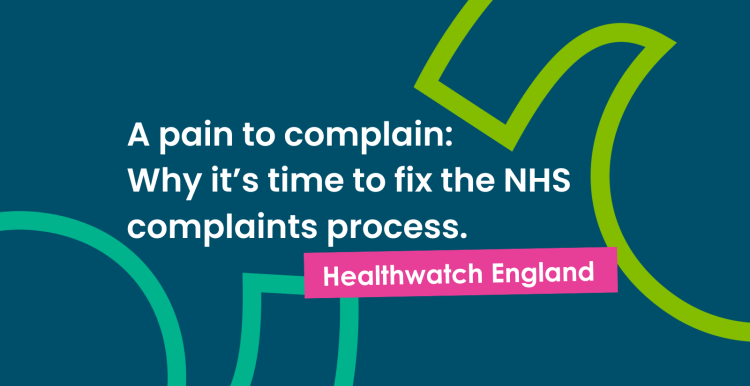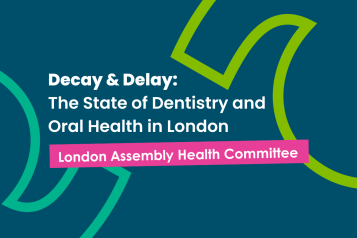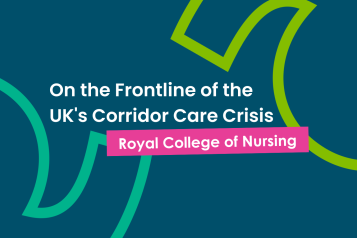A pain to complain: Why it’s time to fix the NHS complaints process.

Context
Written complaints in the NHS reached a record high in 2024. With public satisfaction with the NHS at record low levels, the way the NHS handles, responds and learns from complaints is vital.
A high quality, responsive NHS complaints process not only provides a key way for services to learn and improve care, it also shows patients that the NHS values their feedback.
When Healthwatch England first reviewed the NHS complaints process over a decade ago, they found major failings and called for reform. To establish if people’s confidence or experience has improved, they conducted new research between September and December 2024.
What Healthwatch England found should concern NHS leaders, government and regulators. Low public confidence is preventing people from taking any action after experiencing poor care, meaning that current complaints numbers could just be the tip of the iceberg. There is little evidence that complaints are being systematically used to improve care
Key findings:
Very few patients complain.
Almost a quarter (24%) of respondents shared that they had experienced poor NHS care in the past year. Yet more than half (56%) of people who experienced poor care took no action, and fewer than one in 10 (9%) made a formal complaint.
Low confidence stops people acting.
Of those who didn’t make a complaint after poor care, 34% believed that the NHS wouldn’t use their complaint to improve services, 33% thought organisations wouldn’t respond effectively, and 30% felt the NHS wouldn’t see their concern as ‘serious enough’.
A poor complaints experience is common
Over half (56%) of people who made a formal complaint were dissatisfied with both the process and the outcome of their complaint.
Falling investment in support to help people complain.
The budget allocated to councils to arrange statutory NHS complaints advocacy for local people has declined by more than 20% over the last decade.
People experience long waits for responses.
On average, integrated care boards (ICBs) took 54 working days to respond to complaints they handled as commissioners of NHS services. Response times ranged from between 18 and 114 working days.
The NHS is not effectively learning lessons.
NHS organisations do not effectively capture the right data about who makes complaints, do not welcome complaints or fail to fully demonstrate learning from complaints. There is little national oversight and accountability over the complaints process.
Key recommendations
These findings show that the NHS does not consistently welcome, handle, respond or learn from complaints in a patient-centred manner. Action is needed to:
Make the complaints process easier for patients and their families to navigate
- NHS England (NHSE) should require NHS bodies to collect wider data about complainants, such as gender, ethnicity and disability.
- The Department of Health and Social Care (DHSC) should set detailed and mandatory standards on NHS ‘front-door’ information - including on the NHS App - about how people can navigate the complaints process.
- DHSC should commission a comprehensive review of statutory NHS complaints advocacy services.
Monitor and improve the performance of organisations that handle complaints
- DHSC should set mandatory response times for complaints following a baseline exercise on current average response times at all providers and ICBs
- NHS organisations should survey patients after complaint cases are closed to monitor their satisfaction with the process and outcomes.
- NHSE should require all NHS bodies to report on new performance indicators of complaint handling, including the number of re-opened complaints, and the number of complaints referred to the Parliamentary and Health Services Ombudsman (PHSO).
- NHSE should carry out a performance audit on ICB compliance with the 2009 complaints handling regulations.
Develop a culture of listening to and learning from complaints
- DHSC should strengthen regulations to require NHS bodies to publish their annual complaints reports, rather than ‘on request’ as currently required.
- DHSC should require providers to better demonstrate learning from complaints through more detailed annual complaints reports.
- DHSC should make the PHSO’s NHS Complaints Standards mandatory and clarify which body should lead in monitoring and enforcing them.
- NHSE should assess ICBs’ complaints handling in ICB annual assessments.
- The Care Quality Commission (CQC) should improve the regulation of providers’ complaints’ handling responsibilities by checking this at every new and full assessment.
We need an effective NHS complaints system
Making a complaint is a right enshrined in the NHS Constitution. Introduced in 2009, the constitution pledges to listen and learn from complaints and drive improvements in patient care.
An effective complaints system should be an essential part of improving health services and restoring public satisfaction with the NHS, which is at a record low, 24%, according to data from The King’s Fund.
In recent years, numerous public inquiries and reports have called for changes to the complaints system after providers and regulators failed to act in serious safety cases.
In 2014, Healthwatch England published a report on people’s experiences of health and care complaints systems, following the scandal at Mid-Staffordshire Hospital. Suffering in Silence concluded that people found “making complaints overly complex, incredibly frustrating and largely ineffective”.
Since then, there have been structural changes in complaints handling, with England’s 42 integrated care boards taking on powers to handle primary care complaints where patients don’t go to their service directly.
Most recently, the Parliamentary and Health Service Ombudsman, which handles concerns that haven’t been resolved locally, saw a significant rise in complaints about the NHS. They have called on the Government and the NHS to listen and learn "when things go wrong".


